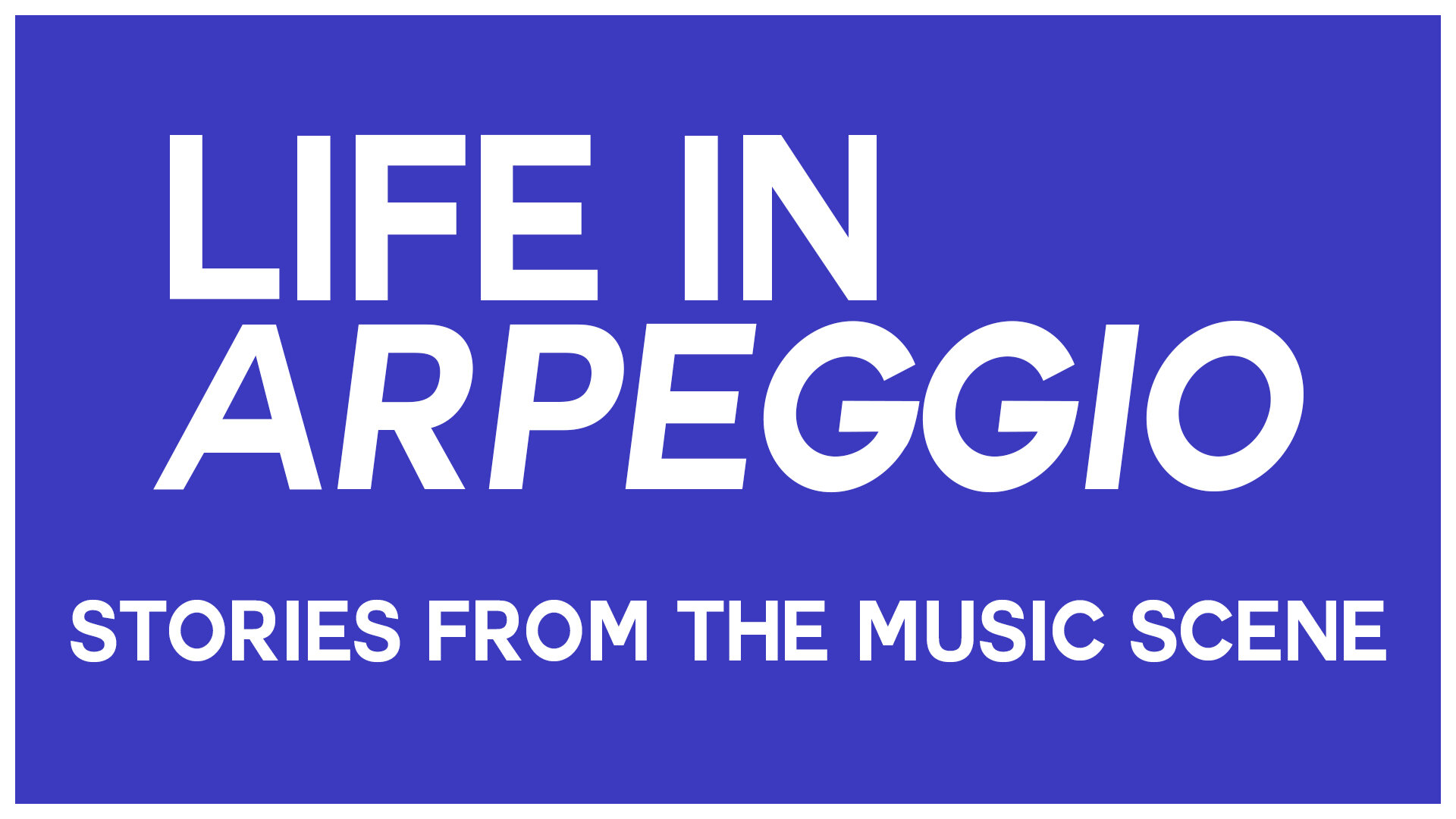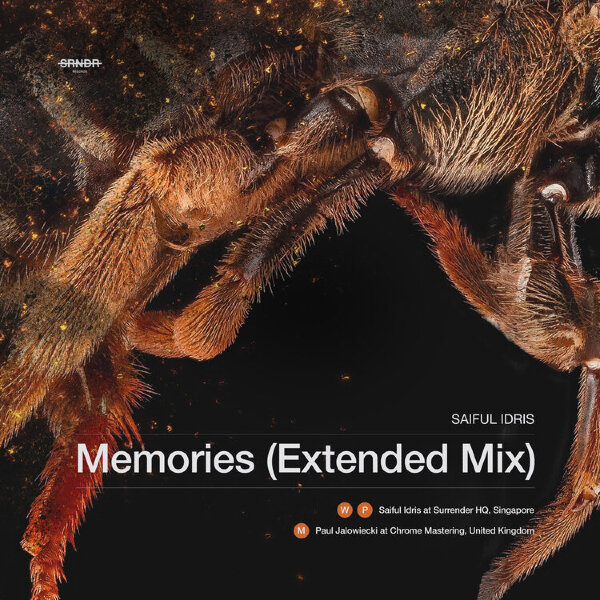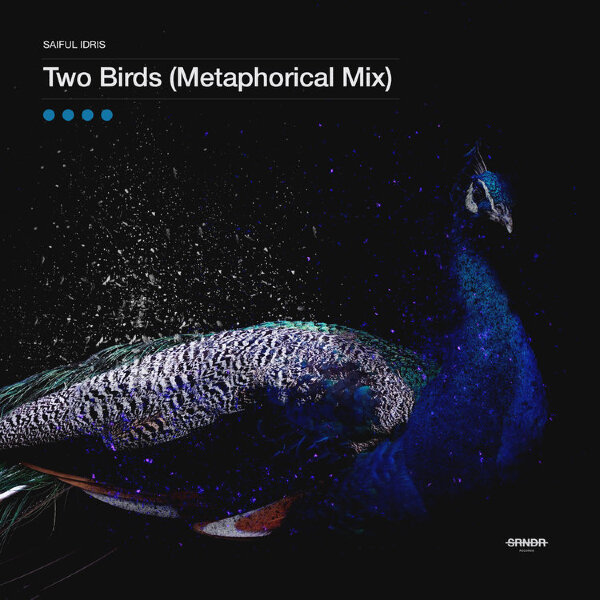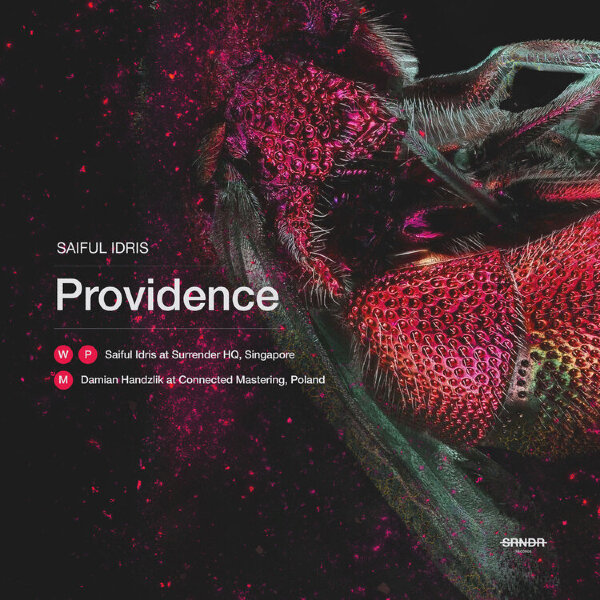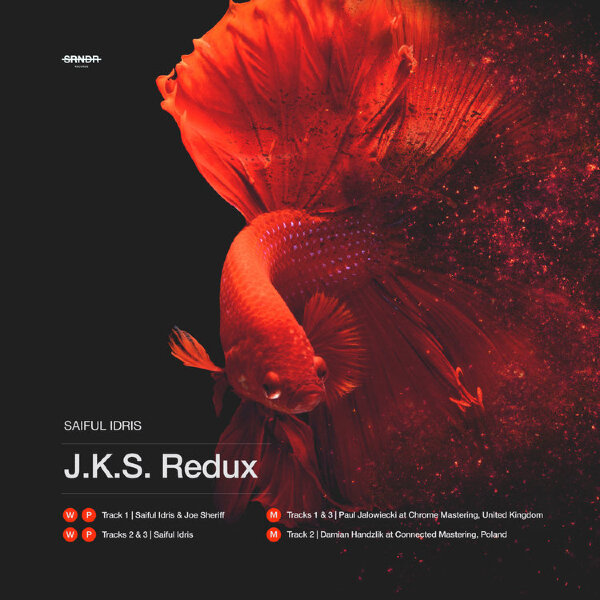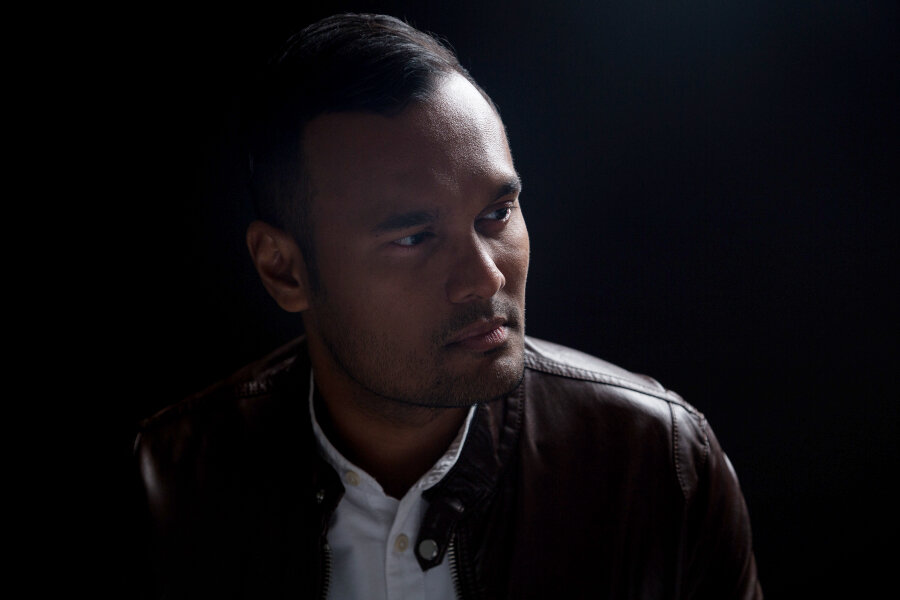The Great SRNDR Experiment: Saiful Idris On Evolving From Indie Icon To House Producer
Saiful Idris’ progression with house music is a rejuvenating swerve from his frontman duties with The Great Spy Experiment (Credit: Saiful Idris)
Not just anyone can brandish the reputation of being one of the nation’s most influential rockstars. If you flip through the pages of the history books regarding our local music scene in the noughties, it’d be impossible not to come across The Great Spy Experiment.
As its charismatic frontman, Saiful Idris handled the reins of the pivotal indie-rock outfit, dominantly becoming one of the industry’s mainstays with guitar-charged anthems like “Class ‘A’ Love Affair” and “Siti In The City”. Saiful and co. were Singapore’s response to the swelling indie rock phenomenon across the world, echoing the likes of The Killers and Bloc Party while still standing apart. And aside from having two locally beloved albums in its repertoire, The Great Spy Experiment was also the first local band to perform at the prestigious SXSW Festival in Texas in 2007, a huge deal at the time that signified a victory for the industry.
But this isn’t the story of Saiful Idris, vocalist of The Great Spy Experiment. This is the story of how he gained a second wind as a house music producer and label owner.
Following the band’s amicable disbandment in 2015, and a stint with side project, The E’s, Saiful found solace dabbling in production, but in a genre worlds apart from his prior indie-rock artistry. Dance music became his muse, rolling out a trajectory that culminated in a string of house singles that gained traction from 2018. With a classic sound that’s universally revered, reminiscent of the melodious, progressive sound of the ’90s, Saiful’s steady productions are an ode to the seminal moments of his youth, as he grew up attending the parties of pre-EDM Zouk.
These auditory time capsules caught the attention of imprints across the globe, being signed to Harmor Records (UK), DataTech (Germany), Stickrsound (The Netherlands) and others. And as another proverbial cherry atop his growing heap of achievements, Saiful launched his very own SRNDR Records (and its parent creative space, Surrender HQ) as an additional platform for his ever-growing ensemble of productions, along with releases from other like-minded producers. Once an inspiration for indie zealots islandwide, Saiful is now on the frontline of emerging house producers in Singapore, with his craft helping to pave the way.
I speak to Saiful in this in-depth interview about his transition, his passion for house, and if we’ll ever see him on the decks anytime soon.
“TGSE was 10 years of my life, so as someone who tends to think too much and is constantly gleaning lessons from life, it was hugely educational.” (Credit: Saiful Idris)
Hi Saiful. You forged quite the legacy with TGSE. Do you ever feel pressure to match that calibre when pursuing a new project? With this one?
Hey Kevin. The simple answer is yes and no. Yes, because when I make music, the goal is always the same: to make music that is true to what I believe in as a songwriter, musician and producer; music that will find its place in people’s hearts. Whether it is indie-rock or progressive house, that desire and the accompanying pressure to create good, emotive music is inherent in my artistic DNA. Which is why I can spend years on a single song just to get it to the best it can be. “Class ‘A’ Love Affair”, for example, was at least two years in the making before I was even ready to share it with the band, let alone others. But it’s all self-inflicted pressure, if that is what it is.
No, because with TGSE, there was always a grand vision that went beyond the music. Our mission was clear: we wanted to change the face of Singaporean independent music. Each of us had been in the scene for a while and saw that there had to be more to it that what it was. At the heart of it, it was about making good music and connecting with people through that music, but a lot of what we did was anchored to a desire to blaze trails, set benchmarks and ultimately, elevate the scene for people within and outside of the scene. And we had good help too. Within the band, we had managers who really believed in the mission and went all out to make it happen. Outside of the band, we had genuine music-lovers from the media, fashion, events and other ‘industries’, all coming together to effect that change. So we were not alone, and thanks to all these people, we managed to do a lot of things that had not been done before by independent musicians, and in so doing, pave the way for others.
With Surrender HQ, it’s truly and purely a passion project. There is no grand vision, no larger goal, just a desire to create the kind of music that got me into this genre to begin with. Hence, the focus on what I call the original school, music that moves the mind, body and soul, built on elements that transcend the different sub-genres of house and techno music, but all bound by a deep appreciation of the structure and aesthetics of early but timeless electronic dance music. And there is no pressure at all to make it anything more than what it is.
Saiful had a momentous run with The Great Spy Experiment (Credit: The Great Spy Experiment Facebook page)
What was your biggest takeaway from your time with TGSE?
TGSE was 10 years of my life, so as someone who tends to think too much and is constantly gleaning lessons from life, it was hugely educational. It didn’t help that, being a late bloomer, the years I spent in the band were perhaps my most truly-formative. Looking back, it’s incredible how different the 2005 and 2015 versions of me are, and though that was not all TGSE, it was the context for a lot of that growth. From learning about people and relationships to learning to deal with people who were by all accounts ‘strangers’ yet were somehow intimately connected with us through the music . From writing songs mostly in my head to seeing first-hand the intricacies of music production (thanks to spending hours sitting next to Leonard Soosay putting the music together). From thinking at the strategic level and making things happen, to learning to let go. There was just so much to be learnt from the whole experience.
But if I had to narrow it down to a single takeaway, it would that by the time I left the band, I had a deep and acute understanding of myself. Again, that’s probably just the timeframe rather than the band experience itself, but the band was a huge part of that timeframe. And it’s incredibly edifying.
When did you start having a passion for house music? Do you still follow it religiously?
I started going to Zouk in early 1999. Truth be told, I was just tagging along with my cooler and musically more-enlightened friends. But we had been to a few of Aldrin Quek’s nights and on one of those, he closed with DJ Rolando’s “Jaguar”. I remember that moment vividly, when I realised the emotive potential of dance music, and that was it. I was always a sucker for emotive music, the result of growing up on a staple of the Beatles, Malay sentimental rock, Queen and death metal, but this was a different kind of emotive and I loved it. A couple of years later, I left to do my undergraduate studies in London, and within my first week, bought a cheap turntable set and started DJ-ing, doing house parties before eventually playing bars around London.
It wasn’t all easy though. One thing I quickly realised was that my taste, and thus repertoire, were very different from pretty much the rest of my immediate social context, i.e. the student population. They were into hip-hop and the commercial end of house music while I was very much informed by what was happening in the clubs, so it was hard to find people with whom I could share my passion for music with. I ended going clubbing alone quite often, once heading all the way up to Nottingham by myself to catch Deep Dish. And it wasn’t just limited to clubbing either. The first festival I went to was Homelands and again, I was there by myself. And in 2002, I took a solo trip to New York to check out the legendary club that was The Shelter. Luckily though, throughout that time, Zouk had an online forum on their website which allowed me to connect with like-minded music-lovers and people back home so that helped with the sense of solitude.
I continued to DJ when I came back to Singapore, playing a few independent gigs. But with TGSE taking off, something had to give so I eventually sold my decks and most of my vinyl records. Fun fact: most of it was bought by Roy Ng, owner of the now-closed Home Club. I was selling them at a flea market at the club and he bought all of it! Then commercial EDM took over and I just lost all interest and stopped caring for dance music for a few years.
During the later TGSE years, I felt that I needed a different creative outlet, so that’s when I started producing dance music. The rest is the present.
“It’s been five years, but I can safely say I’ve only really scratched the surface of what music production and good sound design entail".” (Credit: Saiful Idris)
Do you have time to go out for parties and check out the local dance scene these days?
Not really and this is certainly is an area where I need to do better. I could count with my fingers the number of times I’ve been out in the last couple of years, but between work and being a very involved father, it’s been hard to find the time and energy. I do still attend concerts quite frequently but mostly as a seated member of the audience. So I’ve grown accustomed to being rather sedentary, which is hardly the best trait for the dancefloor [laughs].
Are you self-taught as an electronic producer?
I’m pretty much self-taught in most things in life, even life itself; mostly from making a whole lot of mistakes and doing all kinds of regrettable nonsense. Music-wise, I’ve never had any formal training so everything, from songwriting to playing the guitar, is self-taught. That said, I did learn a lot from watching and working with Leonard in the studio on the two TGSE albums, which was a good starting point when it came to learning about production. In 2011, I got help from Nick Chan (MUON) who shared his copy of Ableton Live and a few sample packs with me, helped set up a simple studio at my home and showed me some of its basic functions. I decided on a whim on New Year’s Eve in 2013 to buy the Ableton Live software proper, and started to seriously learn how to produce a track from scratch by watching video tutorials and just simply mucking about.
And I can’t say enough how much I’ve enjoyed that process of discovery. It’s why I love doing this – aside from being a wonderful outlet for me to express myself, there is just so much to learn. It’s been five years, but I can safely say I’ve only really scratched the surface of what music production and good sound design entail. I think I’ve reached a point now where I can be confident that I can add value to another person’s mix, and as a label owner, that’s something that is giving me great joy, helping my artistes elevate their mixes to the point where they are release-ready. But still, it’s really just the tip of the iceberg.
Of all the genres in dance music, you’ve opted for a classic, progressive house sound in your productions. Why pursue this approach in your music?
Because that’s the kind of dance music I genuinely love. It’s very hard to explain this, and I know this sounds typically boomer, but there’s a certain purity and substance to older dance music that seems to have been lost in most of contemporary mainstream dance music. Back then, it was a celebration of creating something new out of and with a respect for something that came before. It was music without posturing, music that required an investment of time and attention, and when you gave it, you were rewarded for it. It saddens me now that so many media outlets that we send promos of our releases to ask for radio edits. I’m with the original school of thought that appreciates dance music that builds, and takes you on a journey.
Saiful fondly remembers his partying days in the old Zouk at Jiak Kim (Credit: Zouk Singapore Facebook page)
One of your first productions was one dedicated to the old Zouk at Jiak Kim. I’m guessing that establishment was crucial in your youth?
Very much so. Aside from being the place where it all started, Zouk was where I, a decidedly uncool kid, somehow felt completely at home in the coolest place on earth. In those days I was very much an insecure, socially awkward guy. You know, the guy who was always trying too hard. I was just a mess of a person basically, with no sense of who I was. But on the Zouk dancefloor, I was just another face in the faceless crowd, so I could just be and enjoy the music. Because I really did love the music. So I used to spend a lot of time there with the people that I used to be close to, and there were lots of good memories. Plus, TGSE played there more than a few times too, and with the band, there were some insane moments set at Zouk. Our ‘breakout’ show took place there.
You’ve been putting out singles more consistently since then. What have you learnt with the creation and release of each single?
That it’s hard to come up with ideas for artworks! Now I understand why many labels have a single standard design and just vary the text and colour scheme with every release. But that’s “geh kiang” for you. I started the label largely because I wanted to have greater say over how my music was presented visually (one of my first releases when I started doing this seriously was cringeworthy at best – it had a random woman doing a supposedly sensuous pose and the text was just appalling) so now I’m paying the price for that control.
On a more serious note, I’ve learnt that it’s really hard for independent labels to make money. The sheer volume of music being released makes it hard for anyone without any kind of following to not just disappear into the crowd. Thankfully, that’s not the goal, and for each of our releases, we get really good feedback from the DJs to whom we send the promos, so the music is getting heard, and that’s a good start.
How has it been running SRNDR Records? Where and how did you learn the ropes behind running a label? What are the type of acts you look for through your label?
It’s been like everything else, a great opportunity for learning. Before I started the label I had a few releases on independent labels from different countries – the Netherlands, the UK, Belarus, Germany, Denmark. At first, being new to this, I was happy to have my work recognised by other music lovers and shared with a different and hopefully wider audience. Beyond that though, I found that I had not benefited much from working with the majority of those labels. I largely felt that they were not really there to represent me or music. In fact, I barely heard from a few of them after signing the agreement or the release. Many of them had hundreds of releases by hundreds of artistes, and it’s easy to see why I, as I’m sure many others, was overlooked.
So I started the label because I wanted a label that I myself would want to work with as an artiste. A label that builds relationships with its artistes, anchored on a shared love of the music. One that pushes the music as much as it can within its means, and whose practices are anchored on transparency and mutual benefit.
As for the actual, day-to-day running of the label, I would say it’s a culmination and application of my experience of producing and releasing music with TGSE, and producing and releasing music in my current guise with other labels. In fact, a lot of what I do mirrors or is an extension of what I used to do with TGSE – i.e. looking into the band’s branding and promotion, sorting out the administrative stuff, etc – so it’s not too significant a departure despite the very different contexts. Along the way you make some mistakes but you learn a whole lot as well. For example, having worked with so many different mastering engineers, some at great expense, I now have a couple of guys who know and understand my sound and whom I know I can trust to bring out the best in the music. It’s just research and trial and error, until you get it sort of right.
“I’m a firm believer of always aspiring to greater heights regardless of where you are.” (Credit: Saiful Idris)
Do you ever plan to play out as a DJ? I’m sure the scene would go wild if you did.
[Laughs] I’m really not so sure about the response but I would definitely love to. It’s been years since I was behind the decks so I do miss it. But my skills set at the moment is limited to record turntables and CDJs, so I would definitely need to familiarise myself with the digital set-up. The fundamental skills are pretty similar so I’m fairly confident I can do it pretty quickly. I just haven’t gotten round to it.
You’re a true stalwart of the scene. What are some things you’d love to see more in the scene?
Just talking about Singaporean music in general, I’m a firm believer of always aspiring to greater heights regardless of where you are, so I would like to see more artistes push themselves and their music to the highest level. At the moment, there are a few artistes who are really leading the way (how stunning are Charlie Lim’s “Live at the Star Theatre” videos?) and I’d love to see more do the same. That said, I should say that we have come very far in this regard, so it’s not so much a call to action as it is a ‘keep up the good work and pushing on’.
Another good thing I’ve seen is that there’s a great deal of collaboration happening in the scene, and it’s crossing into other disciplines like film, visual arts, fashion and what not, so there’s an ecosystem in place to support the culture. Long may that continue.
I guess the biggest wish though would be that we would one day be rid of the cultural cringe and see Singaporean music and culture be appreciated just as much by our own as they are by others.
And finally, what are your goals for the year ahead?
I’m hoping to grow the SRNDR family and have more like-minded producers on board. 10 months into the label’s inception, we now have six artistes from five different countries sign with us, and already a couple of them are planning more releases on the label. That tells me that we’re on the right track. We’ve got 12 releases lined up from now through the summer and if everything pans out, by the end of the year, we’re looking at close to 20. So as the label owner, I just want to make sure that I do right by the producers who have entrusted their music to the label and do whatever I can to help the music get the audience it deserves.
To follow Saiful Idris and his productions, check out his Surrender HQ website and SRNDR Records.
